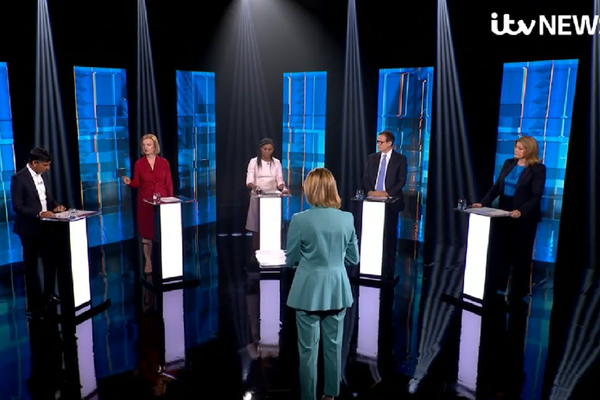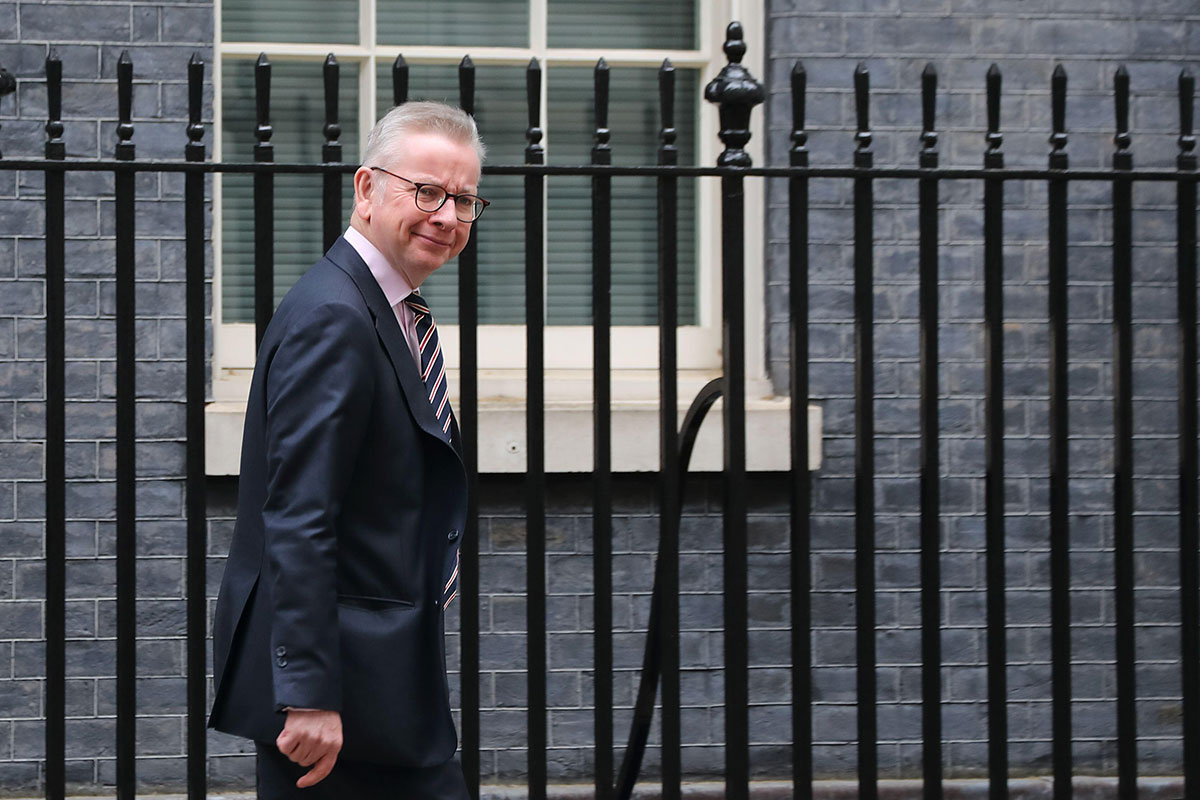You are viewing 1 of your 1 free articles
Updated: Conservative Party leadership contest: what do the candidates think about housing?
As the candidates for the Conservative Party leadership race continue to be whittled down, Lucie Heath outlines what the remaining contenders think about housing
After three years in charge, Boris Johnson is set to step down as prime minister at the beginning of September.
The Conservative Party is currently in the process of selecting a leader, with MPs continuously being eliminated from the race over the coming days until the final two are left to battle it out over the summer.
Inside Housing has summarised what the remaining candidates have previously said, and are promising to deliver, on the subject of housing.
Rishi Sunak
The former chancellor is one of the most recognisable faces still in the running, and many in the sector will be familiar with his meteoric rise over the past few years.
Mr Sunak delivered his first Budget in March 2020 – just one month into the role – announcing a £12bn Affordable Homes Programme, which was warmly welcomed by the sector as one of the largest settlements in years.
Weeks later he famously signed off an unprecedented expansion of the welfare system as COVID-19 hit the UK, including a £20-per-week boost to Universal Credit and a realignment of Local Housing Allowance rates to cover the cheapest third of rents.
These policies were only ever a temporary measure: the £20 uplift was removed last year and LHA rates have been refrozen since 2020. However, this has not stopped Mr Sunak being branded a “socialist” by his right-wing colleagues due to his decision to raise taxes to fund health and social care spending and bring down the deficit post-pandemic.
Despite his reputation for being a big spender, Mr Sunak has not always been forthcoming with money, particularly when it comes to the building safety scandal. While he did sign off on the £5bn Building Safety Fund, Robert Jenrick, who served as housing secretary from 2019 to 2021, later told journalists that the Treasury was unwilling to increase this despite the huge bills being handed to leaseholders.
When Mr Jenrick’s successor, Michael Gove, announced a plan to force developers to pay for work in January this year, he was forced to agree with Mr Sunak’s team that the Department for Levelling Up, Housing and Communities (DLUCH) would meet any shortfall from their own budget if developers were not forthcoming, rather than asking for more from the Treasury.
Housing has not formed a central part of Mr Sunak’s bid to become prime minister so far. During the Tory leadership environment hustings, he vowed to improve the energy efficiency of the country’s housing stock, saying the UK has the "worst houses in Europe". Hopefully, whatever he has planned will be more successful than the failed Green Homes Grant scheme that he launched in 2020.
Liz Truss
Ms Truss is one of the candidates with the most cabinet experience, having held many roles including environment secretary, justice secretary, international trade secretary and, most recently, foreign secretary.
On housing, Ms Truss is ardently pro-development, as can be seen in a video she posted in 2019 in which she bakes and talks about the need to build more homes.
Watch my new video about reviving the British dream of home ownership #homesweethome🏠👇 pic.twitter.com/6kBxDXBKoO
— Liz Truss (@trussliz) May 20, 2019
In 2019, she controversially told the Mail on Sunday that one million homes should be built on the green belt around London, while villages should be allowed to expand by four or five houses a year without having to go through planning.
Mr Truss is in favour of liberalising planning more generally, having previously voiced her support for the introduction of a zonal planning system, an idea that received huge backlash from Conservative MPs when it was included in 2020’s Planning White Paper.
Disagree. Countries like Germany with a zonal planning system have seen far more houses build and that makes them more affordable. Will be saying more about this at @resfoundation on Thursday. https://t.co/5izeZ5tqEE
— Liz Truss (@trussliz) June 4, 2019
Launching her leadership bid, she vowed to introduce zones in the North of England with lower business rates and few or no planning restrictions to encourage investment.
Ms Truss has also told The Telegraph that she would ban "Stalinist" housing targets for local authorities.
On net zero, Ms Truss has told The Spectator that she would introduce a “temporary moratorium” on green energy levies, which are used to fund the installation of energy-efficiency measures in low-income households.
David Cameron did the same thing in response to rising energy bills during his time as prime minister, which has had a lasting impact on efforts to improve the efficiency of the UK’s housing stock.
Penny Mordaunt - eliminated 20/07
An MP since 2010, Ms Mordaunt has held a number of ministerial roles over the past 12 years and is perhaps most famous for becoming the UK’s first female defence secretary – a role she held for 85 days under Theresa May.
The Brexiteer also previously served as a junior minister in the then-called Ministry for Housing, Communities and Local Government from 2014 to 2015, with a focus on decentralisation. From 2016 to 2017, she served as minister of state for disabled People, work and health at the Department for Work and Pensions.
Housing does not seem to be a major priority for Ms Mordaunt, who has made few on-the-record comments on the topic over the years.
However, in her campaign so far she has vowed to establish a taskforce to address stagnation in housebuilding.
She has also promised “to build on the success of projects, such as development corporations, to give all our mayors and local communities additional powers to raise billions of pounds”.
In a piece in The Telegraph titled ’How I will solve Britain’s housing crisis’, Ms Mordaunt said she would focus on brownfield development, get rid of housebuilding targets and extend permitted development rights to build upwards in urban areas.
Ms Mordaunt has publicly said that she supports the UK’s 2050 net zero target.
Kemi Badenoch - eliminated 19/07
Unexpectedly, Ms Badenoch, an emerging favourite from the right of the Conservative Party, is perhaps the candidate with the most direct experience of the social housing sector, having sat on the board of Charlton Triangle Homes.
However, Ms Badenoch, who most recently served as a junior minister at DLUCH, does not appear to have expressed many views on housing. She is currently most well known for her “anti-woke” rhetoric, which has included hitting out at critical race theory and the use of gender-neutral toilets.
More generally, on the economy, she has vowed to reduce taxes to boost growth and has criticised Mr Sunak’s cash handouts to help with the cost of living crisis, branding them “inefficient micro policies”.
Ms Badenoch recently u-turned on her position on the UK’s net zero 2050 target, which she had previously opposed. She now says she backs the target.
Tom Tugendhat - eliminated 18/07
Former soldier and chair of the Foreign Affairs Select Committee, Mr Tugendhat has never held a ministerial position and is probably most known to people for his impassioned condemnation of the fall of Kabul during the summer last year.
However, housing does appear to be an interest of Mr Tugendhat’s, who sits on the All-Party Parliamentary Group for Ending Homelessness.
Unsurprisingly, he has spoken out about the need to fund supported housing for military veterans.
Homelessness is an issue that has been raised by Mr Tugendhat multiple times in the House of Commons, as he had spoken about how hundreds of thousands of people living in temporary accommodation are seeing their potential wasted.
However, it never takes long to find local news stories about Conservative MPs with leafy market town constituencies opposing development in their own area. Mr Tugendhat, who is the MP for Tonbridge and Malling, is no exception.
He recently set out his views on development and planning in an op-ed in The Telegraph, in which he voiced his support for the government’s plans to introduce street votes, which will allow neighbours to write a street plan that would receive permanent planning permission if the majority agree.
He also told the paper he would deliver a brownfield-first housing policy, which could include "changing the business rates treatment of undeveloped brownfield sites to incentivise development and penalise developers who hoard land, driving up prices while vacant derelict sites fall into disrepair".
Mr Tugendhat reportedly told MPs at a leadership hustings event that he would move back the country’s net zero target past 2050.
On the target:
— Chris Skidmore (@CSkidmoreUK) July 13, 2022
Yes to Net Zero 2050: Rishi, Penny, Liz
Move Net Zero target back: Suella, Tom T
Change concept of target to be more accountable/delivery plan: Kemi
Penny and Liz would also suspend green levies
Sign up for our Week in Housing newsletter
Already have an account? Click here to manage your newsletters












